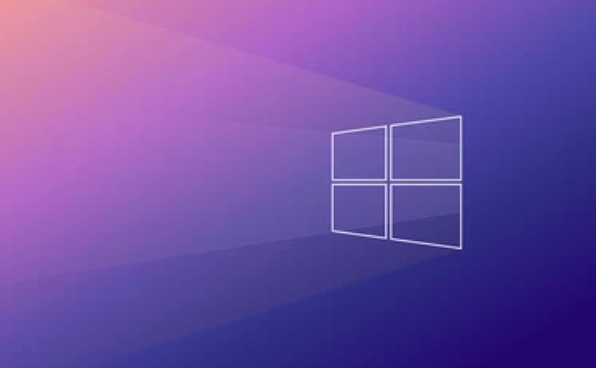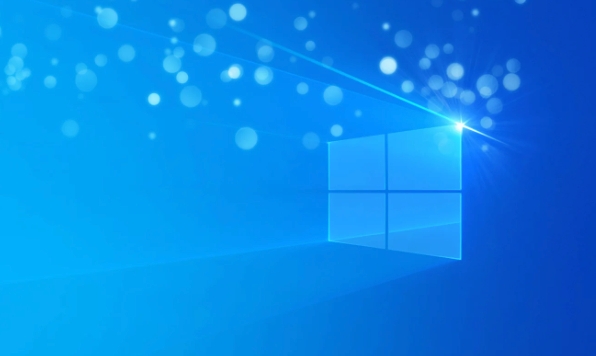The method to enter safe mode varies depending on the Windows version and startup situation. There are mainly the following steps: 1. Windows 10/11 general entry: via "Settings → System → Recovery → Advanced Startup → Reboot Now", after entering, select "Troubleshooting → Advanced Options → Startup Settings → Reboot", and then press 4/F4 (with network) or 5/F5 (without network); 2. Forced entry on Windows 10/11: Press the power button three times in a row to turn off the power, and automatically enter the recovery environment for the fourth time, and the subsequent operations are the same as above; 3. Windows 7 and earlier versions: Press F8 repeatedly to call up the advanced boot options, select "Safe Mode". If it is invalid, you can configure the startup item through msconfig. In safe mode, it can uninstall problem software, delete suspicious startup items, detect viruses, update key drivers, etc., but it is normal to have limited functions. The problem should be solved first and then other settings should be adjusted.

Entering safe mode is a common method to troubleshoot Windows system problems, especially when encountering software conflicts, driver exceptions or virus interference. The following is a description of how to operate the most efficiently based on different system versions and startup conditions.

Windows 10/11: Enter safe mode in regular mode
If you can still enter the system normally, it is recommended to use the "Settings" menu to switch to safe mode:

- Open the "Start Menu", click the power icon → select "Restart" while holding down the Shift key (or use the "Advanced Start" option in Settings → System → Recovery)
- After entering the "Select an Option" interface, click "Troubleshooting → Advanced Options → Start Repair"
- If you need to enter safe mode manually, you can continue to click "Troubleshooting → Advanced Options → Start Settings → Restart". After restarting, press the numeric keys 4 or F4 to enter safe mode with network. Press 5 or F5 without network
This method is suitable for situations where the system can still be started but run unstable, such as lags, frequent pop-ups, etc.
Windows 10/11: Forced restart method enters safe mode
If the system cannot start normally, or you cannot enter the desktop at all, you can try this "stupid" method:

- Force shutdown three times (long press the power button), usually the recovery environment will automatically enter the fourth time
- Then follow the above method to find "Startup Settings" and restart, then press the corresponding number key to enter safe mode
Although this method is a bit violent, it is quite effective when the system is completely stuck, especially when it encounters update failures, blue screens, etc.
Windows 7 and earlier: Press F8 to boot
For old systems such as Win7 and previous versions, usually press the F8 key repeatedly before the power-on self-test screen appears, call up the "Advanced Startup Options" menu, and then use the arrow keys to select "Safe Mode" to press the F8 keys.
However, it should be noted that some new computers may not support F8 shortcut keys even if they are installed with Win7. At this time, you have to use the msconfig configuration in the system to modify the startup item and add a secure boot check.
What can be done in safe mode?
After entering safe mode, the main uses are:
- Uninstall recently installed problem driver or software
- Delete suspicious startup items (adjust in task manager or msconfig)
- Scan for viruses or malicious programs
- Update graphics card or other key drivers
Note: Many functions are limited in safe mode, such as no sound, low resolution, and some peripherals do not recognize. Don't rush to make trouble, solve the problem first.
Basically these are the methods. Different system versions vary slightly, but the overall idea is similar. The key is whether you can enter the system or not. Choose the right method according to the situation. Don’t press F8 randomly as soon as you come up, which is no longer applicable to Win10/Win11.
The above is the detailed content of how to boot Windows in safe mode. For more information, please follow other related articles on the PHP Chinese website!

Hot AI Tools

Undress AI Tool
Undress images for free

Undresser.AI Undress
AI-powered app for creating realistic nude photos

AI Clothes Remover
Online AI tool for removing clothes from photos.

Clothoff.io
AI clothes remover

Video Face Swap
Swap faces in any video effortlessly with our completely free AI face swap tool!

Hot Article

Hot Tools

Notepad++7.3.1
Easy-to-use and free code editor

SublimeText3 Chinese version
Chinese version, very easy to use

Zend Studio 13.0.1
Powerful PHP integrated development environment

Dreamweaver CS6
Visual web development tools

SublimeText3 Mac version
God-level code editing software (SublimeText3)

Hot Topics
 Windows stuck on 'undoing changes made to your computer'
Jul 05, 2025 am 02:51 AM
Windows stuck on 'undoing changes made to your computer'
Jul 05, 2025 am 02:51 AM
The computer is stuck in the "Undo Changes made to the computer" interface, which is a common problem after the Windows update fails. It is usually caused by the stuck rollback process and cannot enter the system normally. 1. First of all, you should wait patiently for a long enough time, especially after restarting, it may take more than 30 minutes to complete the rollback, and observe the hard disk light to determine whether it is still running. 2. If there is no progress for a long time, you can force shut down and enter the recovery environment (WinRE) multiple times, and try to start repair or system restore. 3. After entering safe mode, you can uninstall the most recent update records through the control panel. 4. Use the command prompt to execute the bootrec command in the recovery environment to repair the boot file, or run sfc/scannow to check the system file. 5. The last method is to use the "Reset this computer" function
 The RPC server is unavailable Windows
Jul 06, 2025 am 12:07 AM
The RPC server is unavailable Windows
Jul 06, 2025 am 12:07 AM
When encountering the "RPCserverisunavailable" problem, first confirm whether it is a local service exception or a network configuration problem. 1. Check and start the RPC service to ensure that its startup type is automatic. If it cannot be started, check the event log; 2. Check the network connection and firewall settings, test the firewall to turn off the firewall, check DNS resolution and network connectivity; 3. Run the sfc/scannow and DISM commands to repair the system files; 4. Check the group policy and domain controller status in the domain environment, and contact the IT department to assist in the processing. Gradually check it in sequence to locate and solve the problem.
 How to fix slow right-click context menu in Windows
Jul 04, 2025 am 02:51 AM
How to fix slow right-click context menu in Windows
Jul 04, 2025 am 02:51 AM
The problem of slowing right-click menus is usually caused by extensions or third-party software loaded by the system. Solutions include troubleshooting plug-ins, optimizing settings, and uninstalling suspicious software. 1. Use the ShellExView tool to view and disable non-essential Shell extensions, and gradually test to find plug-ins that slow down the right-click menu; 2. For advanced users, you can lower the menu delay time to 0 or 200 milliseconds by modifying the MenuShowDelay key value in the registry to speed up the response speed, but you need to be careful to backup before operation to avoid causing system abnormalities; 3. Uninstall or update software that may cause conflicts such as old compression tools, screenshot software, antivirus software, etc., and observe whether the right-click menu returns to normal. If the problem is alleviated, it means that it is the performance problem caused by the software.
 the default gateway is not available Windows
Jul 08, 2025 am 02:21 AM
the default gateway is not available Windows
Jul 08, 2025 am 02:21 AM
When you encounter the "DefaultGatewayisNotAvailable" prompt, it means that the computer cannot connect to the router or does not obtain the network address correctly. 1. First, restart the router and computer, wait for the router to fully start before trying to connect; 2. Check whether the IP address is set to automatically obtain, enter the network attribute to ensure that "Automatically obtain IP address" and "Automatically obtain DNS server address" are selected; 3. Run ipconfig/release and ipconfig/renew through the command prompt to release and re-acquire the IP address, and execute the netsh command to reset the network components if necessary; 4. Check the wireless network card driver, update or reinstall the driver to ensure that it works normally.
 Windows time is always wrong
Jul 02, 2025 am 10:56 AM
Windows time is always wrong
Jul 02, 2025 am 10:56 AM
Windows time inaccurate is mainly caused by abnormal network time synchronization or aging of CMOS batteries. Solutions include: 1. Check the "Internet Time" setting to ensure that synchronization is enabled and use time.windows.com or ntp.aliyun.com; 2. Modify the registry key RealTimeIsUniversal to 0 to correctly identify the BIOS time; 3. Replace the motherboard CMOS battery to avoid resetting time after power outage; 4. Turn off "Auto-adjust daylight saving time" or confirm that the time zone settings are accurate. The troubleshooting order is recommended to set the software first and then the hardware problem.
 My second monitor is not detected on Windows
Jul 08, 2025 am 02:47 AM
My second monitor is not detected on Windows
Jul 08, 2025 am 02:47 AM
If the second monitor is not recognized by Windows, first check whether the cable and interface are normal, try to replace the HDMI, DP or VGA cable, confirm the plug-in video output port, and test different interfaces to eliminate compatibility issues; then verify the monitor power and input source settings, and connect the monitor separately to test whether it can be recognized; then enter the Windows display settings and click the "Detection" button, or use Win P to switch the display mode, and update the graphics card driver at the same time; finally check the graphics card specifications to confirm whether it supports multi-screen output to avoid exceeding its maximum output capability.
 Windows could not start because the following file is missing or corrupt
Jul 07, 2025 am 02:39 AM
Windows could not start because the following file is missing or corrupt
Jul 07, 2025 am 02:39 AM
When the boot prompt is "Windows could not start because of the following fileismissing" 1. You can run bootrec/fixmb, bootrec/fixboot, bootrec/rebuildbcd through the Windows installation media; 2. Check the hard disk connection or use CrystalDiskInfo to detect the health status of the hard disk; 3. If there is a dual system, you can use the bootrec command to rebuild the boot or manually add the boot items; 4. Use PE environment to kill viruses and combine DISM and SFC tools to repair the system files, and the system can be restored in most cases.
 How to fix 'SYSTEM_SERVICE_EXCEPTION' stop code in Windows
Jul 09, 2025 am 02:56 AM
How to fix 'SYSTEM_SERVICE_EXCEPTION' stop code in Windows
Jul 09, 2025 am 02:56 AM
When encountering the "SYSTEM_SERVICE_EXCEPTION" blue screen error, you do not need to reinstall the system or replace the hardware immediately. You can follow the following steps to check: 1. Update or roll back hardware drivers such as graphics cards, especially recently updated drivers; 2. Uninstall third-party antivirus software or system tools, and use WindowsDefender or well-known brand products to replace them; 3. Run sfc/scannow and DISM commands as administrator to repair system files; 4. Check memory problems, restore the default frequency and re-plug and unplug the memory stick, and use Windows memory diagnostic tools to detect. In most cases, the driver and software problems can be solved first.






